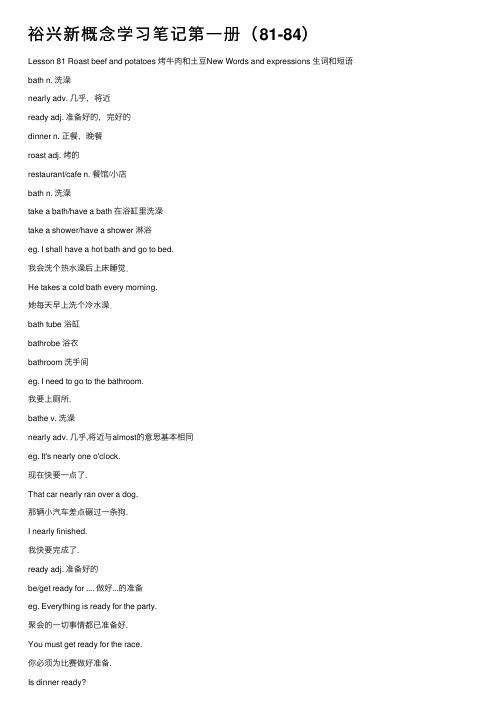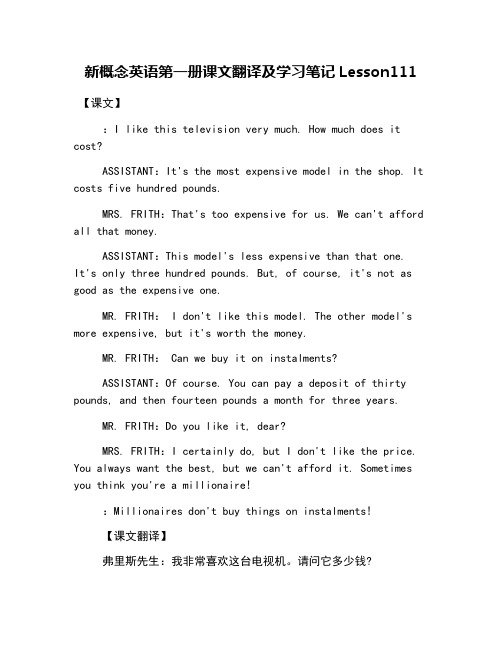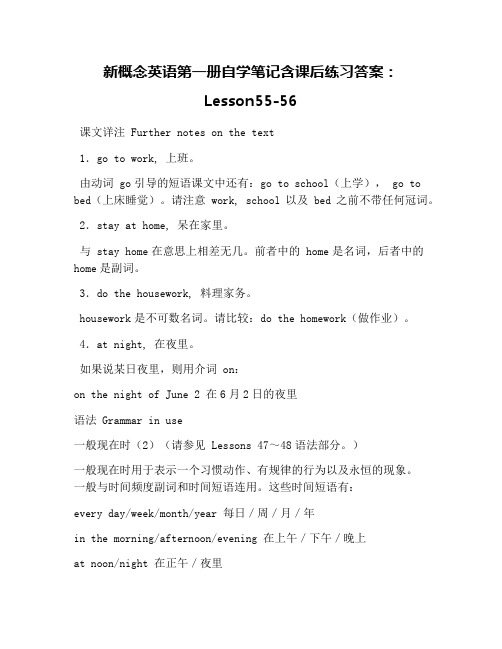新概念第一册学习笔记
裕兴新概念学习笔记第一册(81-84)

裕兴新概念学习笔记第⼀册(81-84)Lesson 81 Roast beef and potatoes 烤⽜⾁和⼟⾖New Words and expressions ⽣词和短语bath n. 洗澡nearly adv. ⼏乎,将近ready adj. 准备好的,完好的dinner n. 正餐,晚餐roast adj. 烤的restaurant/cafe n. 餐馆/⼩店bath n. 洗澡take a bath/have a bath 在浴缸⾥洗澡take a shower/have a shower 淋浴eg. I shall have a hot bath and go to bed.我会洗个热⽔澡后上床睡觉.He takes a cold bath every morning.她每天早上洗个冷⽔澡.bath tube 浴缸bathrobe 浴⾐bathroom 洗⼿间eg. I need to go to the bathroom.我要上厕所.bathe v. 洗澡nearly adv. ⼏乎,将近与almost的意思基本相同eg. It's nearly one o'clock.现在快要⼀点了.That car nearly ran over a dog.那辆⼩汽车差点碾过⼀条狗.I nearly finished.我快要完成了.ready adj. 准备好的be/get ready for .... 做好...的准备eg. Everything is ready for the party.聚会的⼀切事情都已准备好.You must get ready for the race.你必须为⽐赛做好准备.Is dinner ready?晚餐准备好了吗?be ready to do1) 已准备好做 ...eg. I am ready to go.我已准备好出发.2) 愿意做...eg. She is always ready to help others.她总是乐意助⼈.3) 眼看就要...eg. The rope is ready to break.绳⼦眼看就要断了.The child is ready to burst into tears.那⼩孩眼看就要⼤哭起来.dinner1) n. 餐,正餐(三餐中的主要⼀餐)eg. It's time for dinner.该进晚餐了.Dinner is ready.晚餐准备好了.2) n. (正式的) 宴会,晚会dinner party 宴会give a dinner 设宴be at dinner ⽤餐中have breakfast 吃早餐have lunch 吃午餐have supper 吃晚餐have dinner 吃晚饭restaurant n. 饭馆、餐馆cafe n. ⼩餐馆(在英国通常不供应酒类) cafeteria n. ⾃动⾷堂; ⾃助餐厅inn n. ⼩酒馆,⼩旅馆roast1) adj. 烤过的a roast chicken 烤鸡Beijine Roast Duch 北京烤鸭2) v. 烤、烧eg. I roasted a chicken.我烤了⼀只鸡.The beef is roasting nicely in the oven.⽜⾁在烤箱⾥烤得正好呢.3) n. 烤⾁eg. I want some roast.我想要⼀些烤⾁.grill v. (⽤烤架) 烧烤n. 烤架;烧烤的⾁类⾷物grill room 烤⾁馆bake v. 烤( ⾯包, 饼, 通常指在炉中烤)eg. Mother bakes bread or cookies on every Sunday.母亲每逢星期⽇就会烤⾯包或饼⼲.The bread is baking.⾯包正在烤着.baker ⾯包师/商at the baker's 在⾯包店⾥fry v. 油煎deep fry 油炸eg. Can you fry fish?你会煎鱼吗?fried adj. 油煎的deep fried adj. 油炸的fried fish n. 油炸鱼fried potatoes n. 油炸⼟⾖fried eggs n. 煎鸡蛋stew v. 焖,炖/ n. 炖⾁,焖菜eg. I have stewed the beef for two hours.⽜⾁已炖了两⼩时.stewed adj. 焖煮的stew pan n. 炖锅boil v. 烧开,煮熟boil an egg 煮鸡蛋instant boil 涮instant boil mutton 涮⽺⾁TEXT 课⽂Question: Why is Carol disappointed? 卡罗尔为什么感到失望? Listen to the tape then answer this question.听录⾳,然后回答问题。
新概念英语第一册自学笔记含课后练习答案:Lesson 117-118

新概念英语第一册自学笔记含课后练习答案:Lesson117-118新概念英语第一册117-118课课文重难点详解 further notes onthe text1.look for,寻找(强调动作过程);find,找到(强调寻找的结果)。
2.tommy had already swallowed them! 汤米已经把硬币咽了下去!句中用了过去完成时形式 had swallowed。
过去完成时用来表示过去两个动作中发生在前的那个动作。
显然,句中咽下硬币的动作发生在夫妇俩能够把硬币从汤米手中抢过来之前。
3.later that morning,那天上午的晚些时候。
later是副词late的比较级。
4.any changechange是个多义词,既有“零钱”的意思,也有“变化”的意思。
此处既可指“硬币”;也可指“情况的变化”。
这是双关(pun /p)n/)修辞法。
新概念英语第一册117-118课语法知识点 grammar in use过去实行时构成: be的过去式+现在分词。
过去实行时表示过去某时正在实行的情况或动作。
过去实行时和一般过去时经常在同一个句子里使用。
过去实行时表示过去正在实行的情况或动作,一般过去时则表示比较短暂的动作或事件。
过去实行时的时间状语从句一般由when,while及(just)as等来引导,说明主句中动作发生时的背景。
此外,可用 while或 at the time等强调同时实行的两种或几种动作。
请看例句:when i was doing the housework, my husband telephoned mefrom the office.当我正在干家务时,我丈夫从办公室打电话给我。
while i was listening to the stereo, my mother came into the room.我正在听立体声节目时,我母亲进房间了。
just as she was cleaning her shoes, george knocked at the door.她正在擦鞋时,乔治敲门了。
新概念英语第一册课文翻译及学习笔记

新概念英语第一册课文翻译及学习笔记Lesson111【课文】:I like this television very much. How much does it cost?ASSISTANT:It's the most expensive model in the shop. It costs five hundred pounds.MRS. FRITH:That's too expensive for us. We can't afford all that money.ASSISTANT:This model's less expensive than that one.It's only three hundred pounds. But, of course, it's not as good as the expensive one.MR. FRITH: I don't like this model. The other model's more expensive, but it's worth the money.MR. FRITH: Can we buy it on instalments?ASSISTANT:Of course. You can pay a deposit of thirty pounds, and then fourteen pounds a month for three years.MR. FRITH:Do you like it, dear?MRS. FRITH:I certainly do, but I don't like the price. You always want the best, but we can't afford it. Sometimes you think you're a millionaire!:Millionaires don't buy things on instalments!【课文翻译】弗里斯先生:我非常喜欢这台电视机。
新概念英语第一册1-72学习笔记要点

Lessons 1-2课文详注 Further notes on the text1.Excuse me 对不起。
这是常用于表示道歉的客套话,相当于汉语中的“劳驾”、“对不起”。
当我们要引起别人的注意、要打搅别人或打断别人的话时,通常都可使用这一表达方式。
在课文中,男士为了吸引女士的注意而使用了这句客套话。
它也可用在下列场合:向陌生人问路,借用他人的电话,从别人身边挤过,在宴席或会议中途要离开一会儿等等。
2.Yes?什么事?课文中的 Yes?应用升调朗读,意为:“什么事?”Yes?以升调表示某种不肯定或询问之意,也含有请对方说下去的意思。
3.Pardon?对不起,请再说一遍。
当我们没听清或没理解对方的话并希望对方能重复一遍时,就可以使用这一表达方式。
较为正式的说法是:I beg your pardon.I beg your pardon?Pardon me.它们在汉语中的意思相当于“对不起,请再说一遍”或者“对不起,请再说一遍好吗?”4.Thank you very much.非常感谢!这是一句表示感谢的用语,意为“非常感谢(你)”。
请看下列类似的表达式,并注意其语气上的差异:Thank you.谢谢(你)。
Thanks!谢谢!5.数字1~10的英文写法1—one 2—two 3—three 4—four 5—five6—six 7—seven 8—eight 9—nine 10—ten语法 Grammar in use一般疑问句一般疑问句根据其结构又分为若干种。
通过主谓倒装可将带有be的陈述句变为一般疑问句。
即将be的适当形式移到主语之前,如:陈述句:This is your watch.这是你的手表。
疑问句:Is this your watch?这是你的手表吗?(可参见 Lessons 15~16语法部分有关 be的一般现在时形式的说明。
)词汇学习 Word study1.coat n.上衣,外套:Is this your coat?这是你的外套吗?coat and skirt<英>(上衣、裙子匹配的)西式女套装2.dress n.(1)连衣裙;套裙:Is this your dress?这是你的连衣裙吗?(2)服装;衣服:casual dress 便服evening dress 晚礼服Lessons3-41.My coat and my umbrella please. 请把我的大衣和伞拿给我。
新概念英语第一册 学习笔记

新概念英语第一册学习笔记第61至72课61至72课涉及到的语法有:完全动词 have(2)(lesson 61)、情态动词must (lesson 61)、形容词比较级(lesson 63)、反身代词(lesson65)、时间与日期(lesson 66)、用介词at, on和in的时间短语(lesson 67)、一般过去时(2)(lesson 67、69、71)Lesson 61 A bad coldtongue n. 舌头remember v. 记得,记住。
含义较广,多指无意识地回忆起往事,也可指通过主观努力去记忆。
retell vt. 再讲,重复,重说recite v.背诵,朗读,叙述recall 记忆,记住,回忆,比remember文雅,指想方设法回忆已经遗忘之事。
recollect v.(不用于进行时)记起;回忆起;记得。
指在记忆中搜索,设法想起一时想不起的事情或人,强调过程。
remind 使想起,指经某人或某事的提醒而回忆起某件已遗忘之事。
memorize指有意识的下功夫把某事的整个细节都记在脑子里。
review v.复习,复查或重新考虑(某事物);思考(尤指往事),回顾repeat 引用,复述,仅强调口头或笔头重复别人的话或字句,并不必指明出处。
cite 指引经据典以示证明或凭据。
quote指不加剪裁的直接引用原文或原话。
[kwəut]fell ill, 感觉病了;look ill, 看起来有病。
前者指自我感觉,后者指外表形象。
ill是表语,look和feel都是系动词,可像am/is/are那样,后面跟形容词。
…so he must stay in bed for a week…因此他必须卧床休息一周。
so表示"因此"、"所以"。
for可以引出一段时间,表示某个动作持续多少时间。
又如:for two hours each day 每天两小时That's good news for Jimmy. 对吉米来说,这可是个好消息。
新概念第一册课文翻译及学习笔记【Lesson121、123、125】

【导语】新概念英语作为⼀套世界闻名的英语教程,以其全新的教学理念,有趣的课⽂内容和全⾯的技能训练,深受⼴⼤英语学习者的欢迎和喜爱。
为了⽅便同学们的学习,⽆忧考为⼤家整理了⾯的新概念第⼀册课⽂翻译及学习笔记,希望为⼤家的新概念英语学习提供帮助!Lesson121【课⽂】 Customer: I bought two expensive dictionaries here half an hour ago, but I forgot to take them with me. Manager: Who served you, sir? Customer: The lady who is standing behind the counter. Manager: Which books did you buy? Customer: The books which are on the counter. Manager: Did you serve this gentleman half an hour ago, Caroline? He says he's the man who bought these books. Caroline: I can't remember. The man whom I served was wearing a hat. Manager: Have you got a hat, sir? Customer: Yes, I have. Manager: Would you put it on, please? Customer: All right. Manager: Is this the man that you served, Caroline? Caroline: Yes. I recognize him now. 【课⽂翻译】 顾客:半⼩时以前我在这⾥买了两本很贵的辞典,但是我忘了拿⾛。
新概念英语第一册Lesson123~128课文翻译及学习笔记

【导语】学习新概念英语并不难啊。
你还在为英语成绩低拖后腿⽽烦恼吗?不要着急,⼩编为⼤家提供了“新概念英语第⼀册Lesson123~128课⽂翻译及学习笔记”。
相信加⼊学习当中的你,很快便不再受英语的困扰!还在等什么?和⼩编⼀起来学习吧!新概念英语第⼀册Lesson123~124课⽂翻译及学习笔记 【课⽂】 MIKE: Look, Scott. This is a photograph I took during my trip to Australia. SCOTT: Let me see it, Mike. SCOTT: This is a good photograph. Who are these people? MIKE: They're people I met during the trip. MIKE: That's the ship we travelled on. SCOTT: What a beautiful ship! SCOTT: Who's this? MIKE: That's the man I told you about.Remember? SCOTT: Ah yes. The one who offered you a job in Australia. MIKE: That's right. SCOTT: Who's this? MIKE: Guess! SCOTT: It's not you, is it? MIKE: That's right. MIKE: I grew a beard during the trip, but I shaved it off when I came home. SCOTT: Why did you shave it off? MIKE: My wife didn't like it! 【课⽂翻译】 迈克:看,这是我到澳⼤利来旅⾏时拍的⼀张照⽚。
新概念英语第一册自学笔记含课后练习答案:Lesson55-56

新概念英语第一册自学笔记含课后练习答案:Lesson55-56课文详注 Further notes on the text1.go to work, 上班。
由动词 go引导的短语课文中还有:go to school(上学), go to bed(上床睡觉)。
请注意 work, school以及 bed之前不带任何冠词。
2.stay at home, 呆在家里。
与 stay home在意思上相差无几。
前者中的 home是名词,后者中的home是副词。
3.do the housework, 料理家务。
housework是不可数名词。
请比较:do the homework(做作业)。
4.at night, 在夜里。
如果说某日夜里,则用介词 on:on the night of June 2 在6月2日的夜里语法 Grammar in use一般现在时(2)(请参见 Lessons 47~48语法部分。
)一般现在时用于表示一个习惯动作、有规律的行为以及永恒的现象。
一般与时间频度副词和时间短语连用。
这些时间短语有:every day/week/month/year 每日/周/月/年in the morning/afternoon/evening 在上午/下午/晚上at noon/night 在正午/夜里第3人称单数的谓语动词需加以变位,这可分为几种情况:(1)直接加 -s,如:come----comesarrive----arrives(2)以 -sh, -ch, -o 以及 -s结尾的动词加 -es,如:wash----washesgo----goeswatch----watchesdo----does(3)以辅音加 -y结尾的动词,把 -y改成 -i,再加 -es;而元音加-y结尾的动词,只加 -s即可:hurry----hurriescarry----carriesplay----playsstay----stays词汇学习 Word study1.arrive v.(1)到达;到来:We arrived home early. 我们很早就到家了。
- 1、下载文档前请自行甄别文档内容的完整性,平台不提供额外的编辑、内容补充、找答案等附加服务。
- 2、"仅部分预览"的文档,不可在线预览部分如存在完整性等问题,可反馈申请退款(可完整预览的文档不适用该条件!)。
- 3、如文档侵犯您的权益,请联系客服反馈,我们会尽快为您处理(人工客服工作时间:9:00-18:30)。
Lesson 117 Tommy's breakfast 汤米的早餐New Words and expressions 生词和短语dinning room(hall) 饭厅coin n. 硬币mouth n. 嘴swallow v. 吞下later adv. 后来toilet n. 厕所,盥洗室dinning room 饭厅,餐室(家中的)dinning 餐厅,餐厨用品dinning table 餐桌dinning car 餐车coin n. 硬币a silver coin 银币toss a coin 抛硬币(打赌正面和反面)eg. Could you change the one-dollar bill for coins?我用1美元纸钞和你换硬币好吗?Pay a person bake in his own coin.以其人之道还治其人之身.mouth n. 嘴eg. Open your mouth.张开你的嘴.-Don’t talk with your mouth full!-嘴里塞满食物时不要说话!Shut your mouth!(口语)闭嘴It sounds funny in your mouth.这种话由你的口中说出来,听起来就很可笑。
by word of mouth 口头上from hand to mouth 勉强糊口from mouth to mouth 口口相传have a big mouth 大嘴巴,嘴不严swallow1) v. 吞…, 咽…eg. He swallowed (up) the medicine with water.他把药和水一起吞下1) n. 一口(一口的量)take a swallow of beer 喝一口啤酒at one swallow 一饮而尽★swallow v. 吞下①v. 吞下,咽下Tommy had swallowed the coins.汤米已经吞下了那硬币.②v. 抑制,使不流露I tried hard to swallow my doubts.我强忍着不露出怀疑的神色。
She swallowed a smile and sat there still.她忍住没笑,静静地坐在那里。
③v. 吞并;侵吞Our company was swallowed up by an American company last year.我们公司去年被一家美国公司吞并了。
Nazi Germany nearly swallowed up the whole Europe in World War II.第二次世界大战中,纳粹德国几乎吞并了整个欧洲。
later1) adv. 后来,较迟地,较后地three days later 三天后eg. He came later than usual.他比平常来得晚。
see you later. 回头见sooner or later 早晚,总有一天2)adj. 较迟的,较后的,更近的。
in one’s later life 在某人的晚年eg. Let’s take a later train.我们搭晚一点的火车吧。
toilet n. 厕所,盥洗室bathroom/washroom 家庭用的restroom/lavatory 公用的pulic conveniences 委婉用语(英)comfort station 委婉用语(美)water closet(WC) 委婉用语(欧)toilet paper 卫生纸toilet roll (整卷的)卫生纸toilet soap 香皂toilet water 花露水,化妆水Grammar 用法过去进行时一、构成肯定式:was/ were + 现在分词疑问句式:把was/ were提前否定句式:在was/ were的后面加not二、过去进行时的基本用法1.表示过去某一时间正进行的动作。
这一特定的过去时间通常用时间状语,时间状语从句或由上下文来表示。
eg. They were shaving at seven this morning.今晨七点钟的时候他们正在刮胡子。
She was telephoning a friend when I came in.当我进来时,她在给一个朋友打电话。
2. 表示过去某一阶段一直在进行的动作。
eg. They were waiting for you yesterday.他们昨天在等你。
She was writing a story last year.她去年在写一部小说。
3.表示从过去某一个时间的角度看将要发生的动作,用于某些瞬间动作;go, come, leave, stay, fly 等。
eg. They were leaving a few days later.几天后他们要离开。
(从过去看)They are leaving in a few days.几天后他们要离开。
(从现在看)He told me that his brother was going to Suzhou.他告诉我他的哥哥要到苏州去。
4)与always 等副词连用,表示感情色彩。
eg. My brother was always losing his keys.我的哥哥总是把他的钥匙弄丢。
As a boy, John was always making things.还是孩子的时候,约翰总是制作东西。
三.过去进行时和一般过去时用法的比较1. 过去进行时通常有示在过去某一时刻或某一段时间正在进行的动作,强调在这一过程中所进行的动作或展开的情景;而一般过去时则只表示在过去某一时间发生某一件事。
eg. He drew a picture yesterday afternoon.(过去某一时间发生的事情,昨天下午画了一副画)He was drawing a picture yesterday afternoon.(昨天下午这一段时间所进行的动作是画画,强调这一过程中所进行的动作)2)过去进行时可以表示过去反复做的动作,而一般过去时表示具体的某一次行为动作。
eg. The frog was jumping up and down.这青蛙在不停地跳着.The frog jumped up and down.这青蛙跳了一下.He was nodding.他不停地点头。
He nodded.他点了点头。
3. leave, arrive, start, die 等用在过去进行时表示“快要完成,即将…”。
而用在一般过去时当中则表示“己经完成”。
eg. The train was stopping.火车快要停了。
The train stopped.火车停了。
Text: 课文When my husband was going into the dining room this morning, he dropped some coins on the floor.There were coins everywhere. We looked for them, but we could not find them all.While we were having breakfast, our little boy, Tommy, found two small coins on the floor.He put them both into his mouth. We both tried to get the coins, but it was too late. Tommy had already swallowed them!Late that morning, when I was doing the housework, My husband phoned me from the office.'How's Tommy?' he asked. 'I don't know,' I answered, 'Tommy's been to the toilet three times this morning, but I haven't had any change yet!'课文讲解:When my husband was going into the dining room this morning, he dropped some coins on the floor.今天早晨我丈夫走进饭厅时,把一些硬币掉在地上了.1.此句是过去进行时,结构是was/ were+ doing 表示过去某个时刻正在进行或发生的动作。
2. go into 走进,强调“进入”的动作,反义词go out of 走出…3. drop 掉下eg. Be careful! Don’t drop the vase.小心,别把花瓶摔了。
drop 还可以表示丢失,丢掉eg. I dropped my pen on the way home.回家的路上,我把等弄丢了。
There were coins everywhere. We looked for them, but we could not find them all.到处都是硬币,我们虽然找了,但没能把它们全部找到.1)everywhere 到处eg. I looked for my pen everywhere, but I couldn’t find it.我找遍了任何地方都找不到我的钢笔。
2. look for 寻找(强调动作和过程)find 找到(强调寻找的结果)eg. She was looking for her passport yesterday.Did she find it?Yes, She found it under the chair.3. but we could not find them all.find 强调找的结果。
all 是them的同位语。
4. could 是can的过去式。
While we were having breakfast, our little boy, Tommy, found two small coins on the floor.正当我们吃早饭时,我们的小孩汤米在地上找到了两枚小硬币.1. while“当…时”,过去进行时的时间状语从句一般由when, while及as等引导,说明主句中动作发生的情景。
while或at the same time强调同时进行的两种或几种动作。
